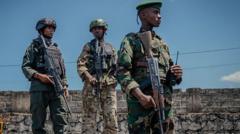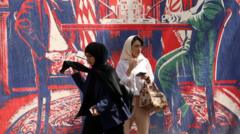The foreign ministers of DR Congo and Rwanda signed a landmark agreement in Washington, committing to respect each other's sovereignty and draft a peace plan by May 2. The deal, witnessed by U.S. Secretary of State Marco Rubio, reflects an effort to quell escalating conflict in eastern DR Congo, where M23 rebels backed by Rwanda have taken control of major cities.
Rwanda and DR Congo Forge Path to Peace Amid Ongoing Conflict

Rwanda and DR Congo Forge Path to Peace Amid Ongoing Conflict
In a crucial diplomatic agreement, Rwanda and the Democratic Republic of Congo pledge to draft a peace deal, aiming to address the escalating violence and territorial disputes fueled by armed groups.
Article text:
In a significant move towards reconciliation, Rwanda and the Democratic Republic of Congo (DR Congo) have inked an agreement designed to uphold mutual respect for sovereignty and to work on a peace proposal by May 2. This pact was formalized by the foreign ministers of the two nations during a ceremony in Washington, with the participation of U.S. Secretary of State Marco Rubio, signaling the United States' interest in stabilizing the region.
The backdrop to this agreement is marked by a devastating humanitarian crisis, where hundreds of thousands of civilians have been forced to flee as a result of the M23 rebel group's aggressive expansion into eastern DR Congo, an area rich in valuable minerals. With M23 now controlling key cities like Goma and Bukavu, the Kinshasa government has sought international assistance, including courting U.S. investments in exchange for access to its mineral resources.
The level of distrust and animosity between the two countries has been high, making this diplomatic meeting and the resultant commitment to dialogue an important step forward. The agreement expresses hopes for U.S. government facilitation in boosting investments from the private sector. However, despite the talks, clashes were reported in North Kivu province, illustrating the ongoing volatility in the region.
Earlier this week, both DR Congo and M23 representatives declared intentions towards achieving a peaceful resolution, aiming for a permanent ceasefire. The recent surge in violence has resulted in an alarming toll, with reports indicating around 7,000 lives lost since the beginning of the year.
The complexities of the conflict are further compounded by DR Congo's allegations that Rwanda is actively supporting the M23 rebels, a claim Rwanda has consistently denied despite backing from both the UN and the U.S. Understanding the historical roots of this conflict, including issues surrounding community identities and regional power dynamics, is critical for grasping the challenges that lie ahead in the pursuit of peace.
In a significant move towards reconciliation, Rwanda and the Democratic Republic of Congo (DR Congo) have inked an agreement designed to uphold mutual respect for sovereignty and to work on a peace proposal by May 2. This pact was formalized by the foreign ministers of the two nations during a ceremony in Washington, with the participation of U.S. Secretary of State Marco Rubio, signaling the United States' interest in stabilizing the region.
The backdrop to this agreement is marked by a devastating humanitarian crisis, where hundreds of thousands of civilians have been forced to flee as a result of the M23 rebel group's aggressive expansion into eastern DR Congo, an area rich in valuable minerals. With M23 now controlling key cities like Goma and Bukavu, the Kinshasa government has sought international assistance, including courting U.S. investments in exchange for access to its mineral resources.
The level of distrust and animosity between the two countries has been high, making this diplomatic meeting and the resultant commitment to dialogue an important step forward. The agreement expresses hopes for U.S. government facilitation in boosting investments from the private sector. However, despite the talks, clashes were reported in North Kivu province, illustrating the ongoing volatility in the region.
Earlier this week, both DR Congo and M23 representatives declared intentions towards achieving a peaceful resolution, aiming for a permanent ceasefire. The recent surge in violence has resulted in an alarming toll, with reports indicating around 7,000 lives lost since the beginning of the year.
The complexities of the conflict are further compounded by DR Congo's allegations that Rwanda is actively supporting the M23 rebels, a claim Rwanda has consistently denied despite backing from both the UN and the U.S. Understanding the historical roots of this conflict, including issues surrounding community identities and regional power dynamics, is critical for grasping the challenges that lie ahead in the pursuit of peace.




















